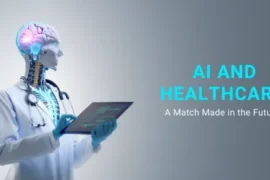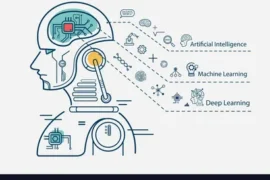Introduction
Artificial Intelligence (AI) is rapidly transforming various industries, and healthcare is no exception. AI-driven healthcare systems hold the potential to revolutionize medical practices by improving diagnostic accuracy, treatment efficiency, and overall patient care.
However, as these advancements take center stage, two critical issues emerge: privacy and accuracy. In a field as sensitive as healthcare, maintaining the privacy of patient information and ensuring the accuracy of AI systems is paramount.
This blog post will explore the importance of privacy and accuracy in AI-driven healthcare systems, dissecting the challenges, opportunities, and ethical considerations that come with their implementation.
The discussion will be divided into four sections: the role of AI in modern healthcare, the challenges of privacy in AI-driven healthcare systems, the significance of accuracy in healthcare AI applications, and strategies for balancing privacy and accuracy in these systems.

The Role of AI in Modern Healthcare
The integration of AI in healthcare systems is a game-changer for many reasons. From predictive analytics to robotic surgeries, AI-driven healthcare systems are transforming the landscape of medicine.
These systems leverage large amounts of data to perform tasks that traditionally required human expertise, such as analyzing medical images, predicting disease progression, and personalizing treatment plans.
One of the most promising applications of AI in healthcare is its ability to enhance diagnostic accuracy. AI algorithms can analyze vast datasets, such as electronic health records (EHRs), genomic data, and medical imaging, to identify patterns and correlations that may be missed by human clinicians.
For instance, AI-driven image recognition tools are being used to detect early signs of diseases like cancer and Alzheimer’s with a high degree of accuracy. In fact, studies have shown that AI can match or even surpass human experts in certain diagnostic tasks.
However, as AI becomes more embedded in healthcare systems, it raises significant concerns about privacy and the management of sensitive patient data. AI-driven healthcare systems require vast amounts of data to function effectively.
This data often includes personal health information (PHI), which is protected under laws like the Health Insurance Portability and Accountability Act (HIPAA) in the United States. As healthcare systems increasingly rely on AI to process and analyze this data, safeguarding patient privacy becomes a critical issue.
Privacy Concerns in AI-Driven Healthcare Systems
The privacy of patient data is one of the most pressing concerns in AI-driven healthcare systems. With healthcare becoming more digitized and AI systems requiring large datasets to function, the amount of sensitive information being collected, stored, and analyzed is growing exponentially. This trend raises several ethical and legal questions regarding how to protect this data from breaches, unauthorized access, and misuse.
AI-driven healthcare systems often rely on personal health data to make accurate predictions and decisions. While this can lead to better healthcare outcomes, it also means that sensitive information is frequently transmitted, shared, and stored across various platforms.
In an era where cyberattacks and data breaches are increasingly common, the risk of exposing sensitive patient data is higher than ever. High-profile data breaches in the healthcare industry have highlighted the vulnerabilities in digital health systems, prompting the need for robust security measures.
One of the core privacy challenges in AI-driven healthcare systems is the potential for re-identification. Even when patient data is anonymized, AI algorithms can, in some cases, re-identify individuals by cross-referencing datasets from different sources.
This undermines the effectiveness of traditional privacy-preserving techniques, such as data anonymization or de-identification. It calls for more advanced privacy-enhancing technologies (PETs) to ensure that patient information remains secure.
Another challenge is the legal and regulatory framework surrounding patient privacy in AI-driven healthcare systems. While regulations like HIPAA provide guidelines for protecting personal health information, they were not designed with AI in mind.
This creates a gap between the capabilities of modern AI-driven systems and the legal requirements for maintaining privacy. As AI continues to evolve, so too must the regulatory frameworks that govern its use in healthcare to ensure that privacy concerns are adequately addressed.
Moreover, AI algorithms often operate in a “black box” manner, meaning that their decision-making processes are not always transparent. This opacity can make it difficult for patients to understand how their data is being used, further complicating privacy issues. Ensuring that AI systems are transparent and accountable is essential for maintaining trust in AI-driven healthcare systems.
Accuracy: A Vital Component in AI-Driven Healthcare Systems
While privacy concerns are crucial, they should not overshadow the importance of accuracy in AI-driven healthcare systems. The accuracy of AI models is directly linked to the quality of care provided to patients. Inaccurate predictions or diagnoses can lead to mistreatment, delayed interventions, or, in the worst cases, harm to patients.
One of the primary ways AI-driven healthcare systems improve accuracy is through machine learning algorithms that learn from vast amounts of data. These systems can identify patterns in data that are invisible to human clinicians, making them powerful tools for enhancing diagnostic accuracy. For example, AI-driven systems have been shown to outperform radiologists in certain tasks, such as identifying tumors in medical images or detecting diabetic retinopathy from retinal scans.
However, ensuring the accuracy of AI systems is a complex task. AI models are only as good as the data they are trained on. If the data used to train these systems is biased, incomplete, or outdated, the AI’s predictions will be flawed.
This is particularly concerning in healthcare, where incorrect predictions can have life-or-death consequences. For instance, an AI system trained on a biased dataset might provide less accurate diagnoses for certain demographic groups, exacerbating existing healthcare disparities.
Accuracy is also closely tied to the concept of “explainability” in AI. In healthcare, it is crucial not only for AI systems to make accurate predictions but also to provide explanations for their decisions. Clinicians and patients alike need to understand why an AI system made a particular recommendation or diagnosis. This transparency is essential for ensuring that healthcare providers can trust and verify the AI’s outputs, ultimately leading to better patient outcomes.
Furthermore, continuous monitoring and validation of AI-driven healthcare systems are necessary to maintain accuracy over time. As medical knowledge evolves and new data becomes available, AI models must be regularly updated and retrained to ensure their predictions remain accurate and relevant. Without ongoing oversight, even the most accurate AI systems can become obsolete or produce unreliable results.
Balancing Privacy and Accuracy in AI-Driven Healthcare Systems
The challenge for healthcare providers and developers of AI-driven systems is to strike a balance between privacy and accuracy. Both elements are critical to the success and acceptance of AI in healthcare, but they can sometimes be at odds with each other. For example, increasing privacy protections by anonymizing data can reduce the accuracy of AI models by limiting the amount of detailed information available for analysis.
To address this tension, healthcare organizations and AI developers are exploring various privacy-enhancing technologies (PETs) that allow for the secure use of personal data without compromising accuracy. Techniques like differential privacy, homomorphic encryption, and federated learning offer promising solutions to this problem.
Differential privacy is a method that adds “noise” to data, making it difficult to identify individual patients while still allowing AI algorithms to learn from the dataset. This technique preserves privacy without significantly compromising the accuracy of the AI system’s predictions.
Homomorphic encryption, on the other hand, allows data to be encrypted while being processed by AI algorithms, ensuring that sensitive information remains secure throughout the computation process.
Federated learning is another innovative approach that aims to balance privacy and accuracy in AI-driven healthcare systems. Instead of collecting data in a central location, federated learning allows AI models to be trained locally on decentralized data sources, such as hospitals or clinics.
This means that sensitive patient data never leaves the institution, reducing the risk of privacy breaches. The AI model can still learn from a wide range of data, ensuring that it remains accurate without compromising privacy.
Additionally, AI-driven healthcare systems should incorporate robust audit and oversight mechanisms to ensure that privacy and accuracy are maintained over time. Regular audits can help identify potential biases in the data, inaccuracies in the AI’s predictions, or privacy vulnerabilities.
These systems should also be designed with fail-safes to alert clinicians when an AI prediction seems out of the ordinary, allowing for human intervention when necessary.
Ethical Considerations in AI-Driven Healthcare Systems
Beyond the technical aspects of privacy and accuracy, the ethical implications of AI in healthcare cannot be overlooked. AI-driven healthcare systems have the potential to save lives, but they also carry risks, particularly when it comes to patient autonomy, informed consent, and fairness.
One of the main ethical concerns is the potential for AI-driven systems to exacerbate existing health disparities. If AI models are trained on data that primarily represents certain demographic groups, they may produce less accurate predictions for underrepresented populations. This could lead to unequal access to high-quality care and worsen health outcomes for marginalized communities.
Informed consent is another ethical issue that must be addressed in AI-driven healthcare systems. Patients need to understand how their data will be used and the potential risks involved in allowing AI systems to make healthcare decisions. Ensuring transparency and obtaining meaningful consent from patients is essential for maintaining trust in these systems.
Finally, healthcare providers must consider the role of human oversight in AI-driven systems. While AI has the potential to greatly enhance accuracy and efficiency, it should not replace human judgment entirely. Clinicians should remain involved in the decision-making process, particularly in complex cases where ethical considerations are paramount.
Conclusion
AI-driven healthcare systems offer tremendous potential for improving patient outcomes through increased accuracy and efficiency. However, these advancements come with significant challenges, particularly regarding privacy and accuracy. Striking the right balance between protecting patient data and ensuring accurate AI predictions is critical for the success of these systems.
As AI continues to evolve, healthcare providers, developers, and policymakers must work together to create frameworks that protect privacy without compromising accuracy. Ethical considerations, such as fairness and informed consent, should also be at the forefront of discussions surrounding AI in healthcare.
Ultimately, the future of AI-driven healthcare systems hinges on our ability to address these challenges effectively. By ensuring that privacy and accuracy are maintained, we can unlock the full potential of AI in healthcare, delivering better care to patients while safeguarding their rights and well-being.
What are your thoughts on the balance between privacy and accuracy in AI-driven healthcare systems? Please leave a comment below to share your views!




